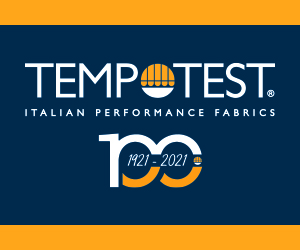First Edition of Heimtextil Tex-Styles to Be Held in October
September 20, 2000
Delhi, India - The India Trade Promotion Organization has a joint-venture agreement with Messe Frankfurt to host the first Heimtextil Tex-Styles exhibition in Delhi, 5-8 October 2000. It's expected that Messe Frankfurt's presence will bring fresh appeal to the home textiles show, formerly known as Tex-Styles.
Laroia said that Messe Frankfurt has reliable data on buyers because of their long experience as organizers of international events. It also has the resources to widely disseminate information about the Indian home furnishing capabilities, which Laroia hopes will attract world wide buyers.
ITPO will promote the exhibition locally while Messe Frankfurt will try to draw the attention of international visitors.
According to a statement by Michale Peters, member of the Board of Management of Messe Frankfurt GmbH, Heimtextil Tex-Styles India, the primary function will be to promote the export of Indian textiles. Secondarily the board hopes the agreement will gain international manufacturers' participation, to make the product spectrum even more interesting for both Indian trade visitors and foreign buyers.
ITPO started the show in 1995 with the primary objective of creating an opportunity for Indian textile producers to export - especially those who had limited financial resources to show their merchandise in overseas shows.
The opening of the Indian economy and its membership in the World Trade Organization also necessitated adding more foreign exhibitors.
According to Pradeep Laroia, senior general manager, ITPO's home textiles export has been consistently growing at 18 percent. "The trend forum will showcase the creative capabilities of the Indian furnishing industry and will be set up with designers of Messe Frankfurt with substantial inputs from India," he added.
For ten years, Messe Frankfurt has been conducting exhibitions outside Germany. While the intention of such events were originally targeted to increase German export business. In the future, affluent Indian consumers will not only have more disposable income but greater brand consciousness. Besides the growing demand for home textiles, there are also increasing expectations of quality of home fashions especially in the case of decorative and furniture fabrics, bed linen and terry products).
Thus Messe believes that India is an important market for consumer goods of all categories and companies should get on-board today. However, the picture is not entirely rosey. The cost of participation has increased substantially and so have exhibitors' expectations.
Many Indian exhibitors may find competition from America for flocks and transfer prints as well from Far East countries mainly in low-priced polyester furnishing fabrics.
Overseas exhibitors may be in for a surprise that the import duty and other levies on certain categories of furnishing fabrics can be as high as 84 percent. Hence the need of merchandise to be unique to India and appropriately priced.
Also several export promotion council bodies in India argued persistently that allowing overseas participants would hurt the domestic industry. Eventually they were forced to concede as economic liberalization policies of Government of India have taken hold.
Laroia said that Messe Frankfurt has reliable data on buyers because of their long experience as organizers of international events. It also has the resources to widely disseminate information about the Indian home furnishing capabilities, which Laroia hopes will attract world wide buyers.
ITPO will promote the exhibition locally while Messe Frankfurt will try to draw the attention of international visitors.
According to a statement by Michale Peters, member of the Board of Management of Messe Frankfurt GmbH, Heimtextil Tex-Styles India, the primary function will be to promote the export of Indian textiles. Secondarily the board hopes the agreement will gain international manufacturers' participation, to make the product spectrum even more interesting for both Indian trade visitors and foreign buyers.
ITPO started the show in 1995 with the primary objective of creating an opportunity for Indian textile producers to export - especially those who had limited financial resources to show their merchandise in overseas shows.
The opening of the Indian economy and its membership in the World Trade Organization also necessitated adding more foreign exhibitors.
According to Pradeep Laroia, senior general manager, ITPO's home textiles export has been consistently growing at 18 percent. "The trend forum will showcase the creative capabilities of the Indian furnishing industry and will be set up with designers of Messe Frankfurt with substantial inputs from India," he added.
For ten years, Messe Frankfurt has been conducting exhibitions outside Germany. While the intention of such events were originally targeted to increase German export business. In the future, affluent Indian consumers will not only have more disposable income but greater brand consciousness. Besides the growing demand for home textiles, there are also increasing expectations of quality of home fashions especially in the case of decorative and furniture fabrics, bed linen and terry products).
Thus Messe believes that India is an important market for consumer goods of all categories and companies should get on-board today. However, the picture is not entirely rosey. The cost of participation has increased substantially and so have exhibitors' expectations.
Many Indian exhibitors may find competition from America for flocks and transfer prints as well from Far East countries mainly in low-priced polyester furnishing fabrics.
Overseas exhibitors may be in for a surprise that the import duty and other levies on certain categories of furnishing fabrics can be as high as 84 percent. Hence the need of merchandise to be unique to India and appropriately priced.
Also several export promotion council bodies in India argued persistently that allowing overseas participants would hurt the domestic industry. Eventually they were forced to concede as economic liberalization policies of Government of India have taken hold.
















